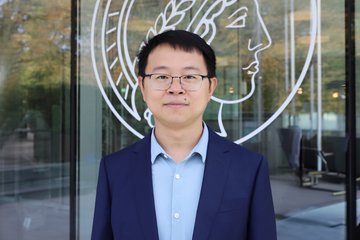A conversation with Rosa Pla Almendros, Konrad Zweigert Scholar
Rosa Pla Almendros is currently studying for a doctorate in private international law (PIL) at the University of Valencia. She took a joint degree in Law and Business Administration at the same institution, graduating with honours and completing an internship at a large law firm. She then decided to pursue a career in research, completing a Master’s degree at the University of Valencia before enrolling in the doctoral programme there. Currently Rosa combines her research work with teaching duties. Before her stay at the Institute as a Konrad Zweigert Scholar, she was awarded a research scholarship for the 2024 autumn term at the London School of Economics (LSE).

(1) What made you choose the Institute for your research?
All practitioners and academics of PIL law know the Max Planck Institute in Hamburg as one of the most renowned research centres in the field. My colleagues and I were no exception. I’ve therefore always been eager to come to the Institute, as a research stay here is the best option for my studies for several reasons.
Firstly, the Institute’s library is a key reference point for PIL and comparative law. It offers a unique opportunity to access books and resources that cannot be found anywhere else, which can of course make a significant difference when conducting research. Secondly, the Institute’s strong reputation attracts the best international talent in the discipline. This enables me to meet the most interesting and knowledgeable people in this area and create personal and professional networks, which will hopefully enable us to develop new projects together in the future. Lastly, the Institute regularly organizes highly distinguished international events on PIL, which are attended by the world‘s leading experts on the subject. I now have an exceptional opportunity to attend some of these events in person.
(2) What resarch topic brought you to Hamburg?
I‘m writing my doctoral thesis on the recently approved Digital Services Act (DSA), a European regulation aimed at protecting users of digital services from the dangerous and opaque online environment created by the major online platforms. The regulation’s effectiveness will depend on its proper enforcement, which combines public and private measures. Essentially, I’m focusing on the (judicial) private enforcement aspect of the instrument. My main goal is to examine the avenues the regulation opens to private individuals as well as to associations like NGOs, who are expected to play a pivotal role in confronting big platforms over non-compliance with the DSA.
Within this framework, I’m currently looking at the PIL issues that judicial private enforcement may give rise to, from both the consumer’s and the company’s point of view. Although the relations it governs are mostly cross-border, the DSA is silent on PIL, which could have a significant impact on the private enforcement of the regulation due to the strategic choices offered by PIL. A major obstacle is that the DSA’s private enforcement regime is not harmonized at the European level, and therefore most of its substantive and procedural aspects must be settled by national law. Consequently, the effectiveness of the regulation and the success of securing the digital environment will depend on jurisdiction and the applicable law. I fear, however, that solutions provided by PIL may not always be the most appropriate. Given this scenario, my research requires a lot of material on EU law and national law, and there is no better place to find it all than the Institute’s library.
(3) How would you describe the Institute to someone who has never been here?
Essentially, I would say that the Institute provides ideal conditions for developing your research. As a visiting researcher, you are provided with a workspace in the library’s common area, which is a quiet and encouraging environment in which to work. You’ll find that everyone is pursuing the same kind of work and has goals similar to yours, which means that you can focus intensely on your research without any distractions. At the same time, this allows you to meet international professionals with whom you can engage in professional discussions and share common experiences and concerns. I think the uninitiated might also be surprised by the size of the library and the range of its resources. I would also add that any issues can be resolved easily, because the library team is very helpful and efficient. In summary, it’s a great place not only to do research, but also to enjoy doing it.
(4) What is your impression of Hamburg?
Along with the above, I believe that the Institute’s location in Hamburg makes it even more appealing. As I mentioned before, the Hamburg Institute is a major hub for private international law in Europe. In addition to that, the city, while cosmopolitan, is very welcoming and pleasant. It’s clean, green, well-kept, luxurious, and quiet but at the same time also modern and vibrant. One could point out that Hamburg offers a noteworthy variety of things to do, but the truth is that simply walking around admiring the scenery is enjoyable, especially on a summer day when the sun shines and the atmosphere becomes almost idyllic.
Image: © Max Planck Institute for Comparative and International Private Law / Johanna Detering












